Domesticated goat
| Domestic goat Temporal range: .01–0 Ma Neolithic – Recent | |
|---|---|

| |
| A pygmy goat on a stump | |
|
Domesticated
| |
| Scientific classification | |
| Kingdom: | Animalia |
| Phylum: | Chordata |
| Class: | Mammalia |
| Order: | Artiodactyla |
| Family: | Bovidae |
| Subfamily: | Caprinae |
| Genus: | Capra |
| Species: | C. aegagrus |
| Subspecies: | C. a. hircus |
| Trinomial name | |
|
Capra aegagrus hircus (Linnaeus, 1758) | |
| Synonyms | |
|
Capra hircus | |
Capra hircus
The domestic goat or simply goat (Capra aegagrus hircus) is a subspecies of C. aegagrus domesticated from the wild goat of southwest Asia and Eastern Europe. The goat is a member of the animal family Bovidae and is closely related to the sheep; both are placed in the goat-antelope subfamily Caprinae. There are over 300 distinct breeds of goat. Goats are one of the oldest domesticated species of animal, and have been used for milk, meat, fur, and skins across much of the world. Milk from goats is often turned into goat cheese.
Female goats are referred to as "does" or "nannies", intact males are called "bucks" or "billies" and juvenile goats of both sexes are called "kids". Castrated males are called "wethers". While the words "hircine" and "caprine" both refer to anything having a goat-like quality, "hircine" is used most often to emphasize the distinct smell of domestic goats.
In 2011, there were more than 924 million goats living in the world, according to the UN Food and Agriculture Organization.
The Modern English word goat comes from Old English gāt "she-goat, goat in general", which in turn derives from Proto-Germanic *gaitaz (cf. Dutch/Icelandic geit, German Geiß, and Gothic gaits), ultimately from Proto-Indo-European *ǵʰaidos meaning "young goat" (cf. Latin haedus "kid"), itself perhaps from a root meaning "jump" (assuming that Old Church Slavonic zajęcǐ "hare", Sanskrit jihīte "he moves" are related). To refer to the male, Old English used bucca (giving modern buck) until ousted by hegote, hegoote in the late 12th century. Nanny goat (females) originated in the 18th century and billy goat (for males) in the 19th.
...
Wikipedia
